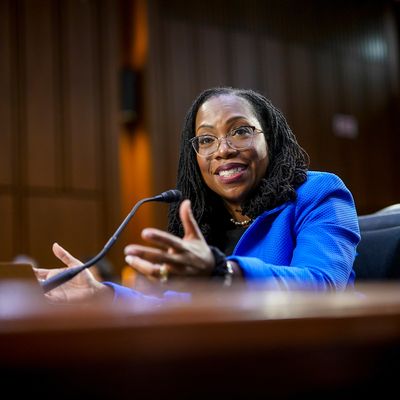
Officially, the point of this week’s hearings at the Senate Judiciary Committee was to consider whether Judge Ketanji Brown Jackson is worthy of the Supreme Court. A few days in, her own performance and the antics of both Republican senators and her future workplace across the street suggested the question is better inverted. Does the Supreme Court deserve her?
Depending on how much of the hearings you subjected yourself to, Wednesday morning was day three or 1 million, an interminable series of Republicans hammering the dignified Jackson with lurid and baseless claims about her rulings on child pornography or representation of Guantanamo detainees. That day, Democratic senator Patrick Leahy used his time to ask Jackson to reflect on how she, as the first Black woman to be nominated to the highest court, would strengthen its legitimacy.
Courts, she gamely explained, only gain their authority through the public’s consent. “When people see that the judicial branch is comprised of a variety of people who have taken the oath to protect the constitution and who are doing their best to interpret the laws consistent with that oath,” Jackson continued, “it lends confidence that the rulings that the court is handing down are fair and just, that that everything has been considered, that no one is being excluded because of a characteristic like race or gender or anything else.” If there’s any problem with Jackson’s likely confirmation to the Court, it’s that she may give voters more confidence in an institution that currently doesn’t deserve it.
The following hour, the Supreme Court’s conservative majority offered a rebuttal to Jackson in the form of an unsigned opinion from the so-called shadow docket, prematurely reaching out to strike down Wisconsin’s state legislative redistricting plan, which would have added another majority-Black district. The effect, explained voting-rights expert Rick Hasen, is an unbidden assault on the Voting Rights Act, another step in “killing off the last major protection for minority voters from discriminatory districting plans.” Six weeks ago, the conservative justices upheld Alabama’s map, which empowered Republicans at the expense of Black voters, on the theory that it was too close to the election to change things up; Wednesday, the Court decided over Justices Sonia Sotomayor and Elena Kagan’s dissent that now is a great time to meddle in Wisconsin if it also benefits Republicans. As Sarah Lipton-Lubet, executive director of Take Back the Court, put it to me, “It’s part of the ‘only Republicans can win’ doctrine.”
The public has noticed. Over the past three years, the number of Americans who told Pew they had a favorable view of the court has declined by 15 points, driven by Democrats who have begun to say they believe that the court is too powerful and too conservative. (Probably not a coincidence that in the same interval, Brett Kavanaugh eclipsed Ruth Bader Ginsburg as the best-known justice.) The Washington Post’s reporting on rabid, QAnon-inflected texts from Ginni Thomas to the White House chief of staff Mark Meadows urging him to overthrow the 2020 election, a matter her husband Justice Clarence Thomas was actively ruling on, is unlikely to improve the court’s standing.
Jackson, meanwhile, is tied with Chief Justice John Roberts in a Gallup poll for most popular nominee to the Court, and that was before the country even saw her respond with dignity and substance to the fulminating of presidential upstarts.
Jackson’s nomination told an optimistic story about American progress. At the hearing, she spoke directly, and movingly, about the contrast between her own ascent and her parents being raised in segregation. She didn’t need to spell out the other ways that the social, political, and legal gains of the last century enabled her life and advancement — the Black franchise and political power that Joe Biden implicitly acknowledged in his vow to nominate a Black woman to the Court before his win in South Carolina’s primary; the ability to choose her own course for work and family. And yet all of these expansions of freedom and equality are under direct threat from a right-wing court and its architects — even, if you asked Indiana’s senator before he backtracked, Jackson’s interracial marriage.
“The symbolic aspect of having a dark-skinned Black woman with braids on the court is not unimportant,” Keeanga-Yamahtta Taylor, professor of African American Studies at Princeton, told me this week. “But the focus on the issues of representation and what it means to include this Black woman in the institution then deflects away a different kind of conversation, about the institution itself.”
Jackson’s nomination comes after the political collapse of the ambitious social insurance, voting-rights, and police-reform bills Democrats pitched early in the Biden administration, Taylor pointed out. “Where they have been unable to produce the kind of material reforms that pushed people into historic levels of protest in 2020,” she said, “we get the symbolic reform.”
Reform of the Supreme Court itself, which had some momentum during the Democratic primary, didn’t even get that far. It stalled with Biden’s toothless commission to study the various proposals, though several high-profile commissioners emerged more convinced that adding seats to the court is the only thing that will save it.
That the proposal is a political nonstarter didn’t stop nearly every Republican from quizzing Jackson about “court packing,” which she repeatedly reminded them was not her lane. “For the court to really represent the American people it needs to look like America,” says Lipton-Lubet. “At the same time, we know that Judge Jackson alone can’t fix the court. She shouldn’t have to. That’s Congress’s job.”
Democrats in Congress do not appear that interested. There are only three Senate co-sponsors — Ed Markey, Elizabeth Warren, and Tina Smith — for the Judiciary Act, which would add three justices. “Obviously I don’t anticipate Joe Manchin coming to my side on the court-expansion issue,” says Meagan Hatcher-Mays, director of Democracy Policy at Indivisible. “There’s a lot of work to do.”
The Supreme Court itself may do some of that work this summer, when it is expected to gut Roe v. Wade, environmental protections, and what’s left of gun regulations. “The unfortunate reality is that the worse the court gets, the more popular Supreme Court expansion gets,” says Hatcher-Mays. “And we all know the court is going to get worse.” Even if, in the short term, a Justice Jackson would make it better.






























